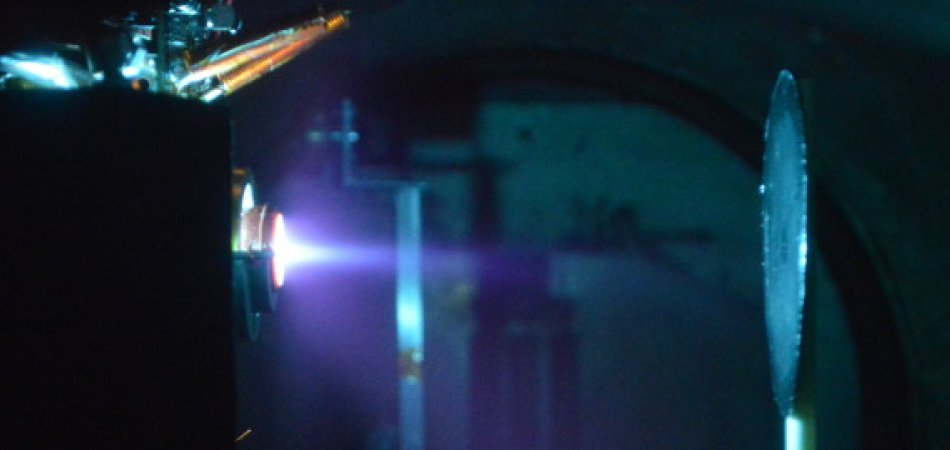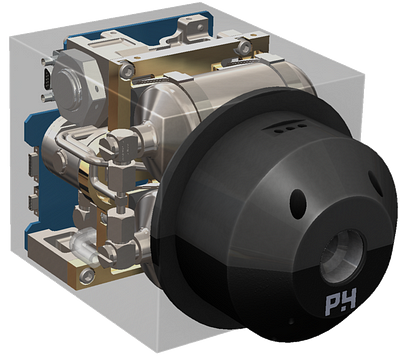Umair Siddiqui ’10 Builds a Startup for the Space Age

Umair Siddiqui ’10 Builds a Startup for the Space Age
Sep
We caught up with M. Umair Siddiqui ’10, Chief Technology Officer at Phase Four, to talk about leading a company that focuses on game-changing spacecraft propulsion. After earning his undergraduate degree from Dartmouth, where he was a James O. Freedman Presidential Scholar and member of the Dartmouth Outing Club, Umair went on to earn a Ph.D. in Nuclear Engineering and Engineering Physics from the University of Wisconsin at Madison.

What does Phase Four do, and what problem are you trying to solve?
Umar Siddiqui: At Phase Four we are disrupting the satellite industry by developing small size, high performance propulsion systems.
The satellite industry currently provides services such as GPS location and weather data, and will be growing exponentially in the next decade, providing world-wide internet and rapidly updated Earth imaging (among many other services).
To achieve this, much of the industry is starting to use the “CubeSat” — a satellite made out of 10 cm x 10 cm x 10 cm “U’s” (short for “units”). This is akin to the standardization of screws, or like building your satellite out of a fixed set of spacecraft Legos. This provides a dramatic reduction in costs to the industry, but there is one major problem: there is no spacecraft engine that can propel such small spacecraft in space for any meaningful amount of time (I’m speaking of in-space propulsion, not the rockets that get the satellites from sea level to space in the first place).
CubeSats are simply free-flyers, like gliders (or less elegantly, tumbleweed). Current satellite engines are tailored to work on school-bus sized, ~$100MM spacecraft, and simply can’t fit on small satellites. Phase Four is developing the “RFT,” a thruster that efficiently heats and accelerates a “plasma” propellant (ionized gas), that fits in the palm of your hand, and that uses less than 100 W of power.

The P4 Radio Frequency Thruster (RFT) is a powerful and innovative propulsion system designed for small satellites — and scalable to much larger vehicles — from LA-based startup Phase Four. As Phase Four’s Chief Technical Officer, Dartmouth alumnus M. Umair Siddiqui ’10 is leading the P4’s development.
The thruster leverages advances in “switching” electronics miniaturization made by the cell phone industry, and RF “plasma heating” knowledge researched by the Department of Energy’s fusion energy program. The RFT will be able to address the propulsion needs of the estimated thousands of small satellites to be launched in the next decade, as well as open up the CubeSat to be able to perform more complex missions than is currently possible.
We will be launching our first missions in the next year (the first launch window opens in end of 2017), and at the risk of sounding overly grandiose, we hope to launch the Wright Flyer of the CubeSat world.
What do you like most about being an entrepreneur? What keeps you up at night?
My career has always focused on doing things no one has done or even thought of before — I like exploring. I used to think a research path was the correct way forward for me in that regard, but I quickly ran into the slow pace of government-based research funding. If you can relate something new and exploratory to a sustainable (preferably disruptive) business plan, then you can raise significantly more funding and on a faster schedule.
What keeps me up at night…is trying to walk the line between surviving as a company and innovating as quickly as possible.
The right investors are just as passionate as you are, and as long as your background and plan are solid, they may be excited to help you challenge the status quo. There is no room for “slow” in the world of startups or entrepreneurship. I’ll admit that since working at a startup, I sleep considerably less than I did before, however what keeps me up at night when I do have a break is trying to walk the line between surviving as a company and innovating as quickly as possible.
Keeping a startup alive is a challenge of innovating fast enough to meet a milestone that generates sales or more investment, but not burning through capital so quickly that you don’t have enough time to do sufficient R&D. It’s an interesting new problem that occurs less in academic, government, or big business labs.
What aspect of your Dartmouth experience do you rely on most as an entrepreneur now?

M. Umair Siddiqui ’10
Without sounding too much like a Dartmouth advertisement, I’d say the liberal arts education in combination with a hard, multi-year research project gave me extremely important skills that are essential at a tech startup company.
My years of physics research, engineering and machining time at Dartmouth gave me the hands on project experience that you simply do not get from classes and pen-and-paper work. Dartmouth strongly encouraged us to take on projects, both for credit and as extracurriculars. Without the research I did in the physics department (which involved mechanical and electrical design, machining and physics experiments under Prof. Kristina Lynch), I would not have been prepared to approach hard science and engineering problems that we encounter everyday at Phase Four.
Dartmouth also pushed us to relate our work to the rest of the world that is not in our field. It was in ENGS-21 that I learned about a basic business plan, break-even chart, and systems comparisons. It was all my writing, both in and out of my science and math classes, that taught me how to explain what I was working on to people who may not have any technical background. These skills carried me through grad school, and I rely on them everyday here at Phase Four.
You can stay up to date on Phase Four news, the launch of their first missions later this year, and career opportunities by connecting with them on social media. To follow their growth as a startup, check them out on AngelList.
